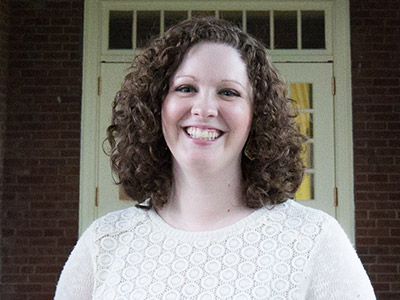Future Church Planter Pursues Joint MDiv/MSW Degree at Pittsburgh Seminary
A graduate of Whitworth University, Ashley S. Ashley moved from Spokane, Wash., to Pittsburgh in the fall of 2012 with her husband, Brendan, who’d decided to enroll at PTS. While he attended class, Ashley worked as the director of youth and young adult ministries at Cross Roads Presbyterian Church in Monroeville, Pa. During those years, she discovered two important things about herself: “I enjoy planning activities for students and young adults, but what I find to be most rewarding are opportunities to meet with individuals, hear their stories, and talk in-depth about their lives.” Though Ashley thought her dream job would be in an established suburban church, “Instead, I began to feel a strong call to join Brendan in church planting.”
Few churches today are capable of holding the hard stories that are already present in their own communities . . . churches need to learn that when they welcome people they have to welcome their trauma as well.
In the light of these insights, Ashley decided to attend PTS herself to pursue an M.Div. with an emphasis in church planting. Her time in the program has provided her with space in the classroom to develop new ideas about God’s work in the world, opportunities to experiment creatively with congregations while participating in field education, and travel to other countries (such as the Netherlands and Egypt) to engage with missional leaders.
Ashley is interested in church planting because she believes that the church is "reformed, yet always reforming.” She resonates with a statement made by historical theologian Jaroslav Pelikan that “tradition is the living faith of the dead; traditionalism is the dead faith of the living. Tradition lives in conversation with the past, while remembering where we are and when we are.” Ashley believes the fields of church planting and missiology encourage the church to follow the direction of the Holy Spirit and partner with neighbors in order to participate in the beauty—and care for the needs—of a particular community.
To care well for the people in her own future congregation and for the city itself, Ashley decided to supplement her M.Div. with an MSW from the University of Pittsburgh—an option made possible thanks to the joint-degree program the two schools share. Ashley’s long-term goal is to work for an organization that cares for people who have experienced trauma and to co-pastor a church plant with her husband. She believes that few churches today are capable of holding the hard stories that are already present in their own communities, but that churches need to learn that when they welcome people they have to welcome their trauma as well.
Ashley, a Thomas Chalmers Honors Scholar, has spent the past year focusing specifically on how the sacraments serve as powerful rituals for healing. She notes, “Baptism and the Lord’s Supper assure survivors that they are welcomed into the community. They are adapted by God and given a space at the table. As the church, we have hope in a great eschatological future, but we also recognize that the Kingdom of God is both here and not yet. As a community, we long for a restored future, but we also recognize that our current world is still broken. This tension is best acknowledged at the Lord’s Table when the community of faith is gathered together to reaffirm their identity in Christ, to stand side by side in solidarity with one another, and to share in the promise that one day Christ will come again to banish evil and injustice forever.”

